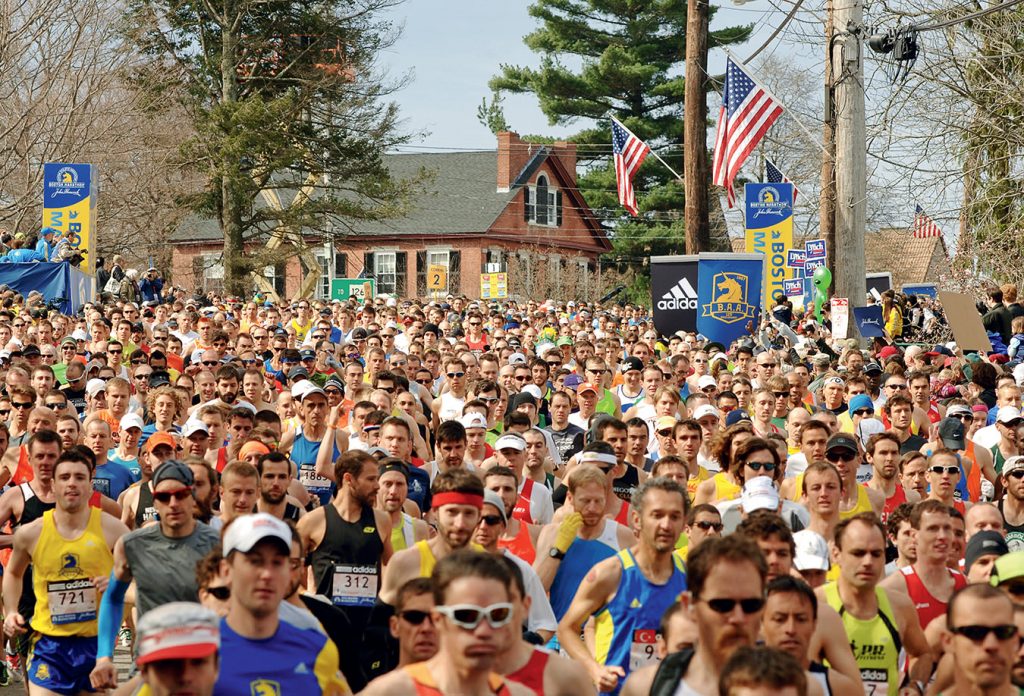As the needle exited the blister underneath the nail of my big toe, blood spurted onto the tile floor of the hotel bathroom. Given the events of the previous 12 hours, the symbolism resonated with me immediately.
Her name was Tammy. I met her on the side of Highway 495 at Exit 21A. We had both been dropped off by loved ones an hour and a half prior to the Boston Marathon. They close down all of the roads in Hopkinton, where the marathon begins, so unless you’re on one of the authorized buses, you get as close as possible and walk to the start line.
Tammy was in her late 30s and was coming off a tough year. She told me about her separation and pending divorce as we ambled along the mile and a half before us. She beamed every time she mentioned her two children. Tammy had run a couple of marathons before, but she’d never run Boston, despite having lived in the area her entire life. A year prior, she’d been a spectator at the event with her youngest son. She decided that day she would run the 2013 race, but because of her tumultuous year, she’d never gotten around to registering. No matter. She was determined to run the race “bandit”: no official time, no official number. She told me how proud her two boys would be to see her finish. I told her how my pregnant wife would be waiting for me just past Mile 26.
I never got her last name, nor any contact information. But Tammy was the first person I thought of when I saw the time on the clock at the finish line on television.
I wasn’t wearing headphones that day. Because I trained for Boston by myself, I usually listened to music when I ran, but I’d run this marathon in 2006 and knew how alive the course would be. I wanted to soak in the atmosphere.
I tried to take mental snapshots of it all, from the waving kids to the fluorescent signs to the occasional booming stereo. There was the guy from Surrey in a Canucks jersey who shouted encouragement. The runner who gave me a spare gel after I’d lost one early in the race. The girls from Wellesley College who offer a kiss in an effort to get runners to stop. I breathed it all in as I tried to maintain my desired pace. The weather was ideal, and I was feeling great.
Just past Mile 14, I felt tension in my quads. I tried to dismiss it, and hoped it would quickly subside. There were still 12 miles to go, and I hadn’t reached the course’s four signature hills. Boston is a net-downhill marathon. Most of the descent is quite gradual, so you don’t realize the subtle toll the route is taking on your quads. I wasn’t expecting to feel this way for another few miles. It was going to be a battle the rest of the way.
I knew my pace had slowed considerably on the final two hills, but with the ascents behind me, I convinced myself I would make it up in the last four miles. My quads refused to absorb that positivity, however, and I struggled the rest of the way. Two hours 54 minutes 39 seconds after leaving Hopkinton, I forced my body across the finish line. I wasn’t as fast as I’d hoped, but at that moment, I didn’t care. I couldn’t find my wife at first.
“You and Fiona ok?”
The text message confused me because I’d just spoken to Trevor Martins at TEAM 1040 prior to the interview. My colleagues there had tracked me down after the marathon to talk about my run, and we’d shared a few laughs on the air. I’d been finished for nearly two hours and had just enjoyed a long, satisfying shower after we’d shuffled back to our downtown hotel. Trevor expressed his relief upon answering my call, and told me to turn on the television.
I hadn’t heard the two bombs go off, and I stared in disbelief at the images I was seeing. Trevor asked me to stay on the line as my wife and I tried to process the situation as it unfolded eight blocks away. The next thing I knew I was attempting to provide context for listeners in the Lower Mainland. A loud blast sent my wife scurrying to the window to see if it was close. We would later learn it was a fire at the JFK Library, but the tension was immediate and palpable.
Phone calls, text messages, and e-mails streamed in as family and friends tried to confirm our safety. My wife handled all of those calls while I spent the next four hours doing interviews across the country, as word of my whereabouts had spread through the various branches of Bell Media. I spent that time insulated from many my own emotions, functioning in “reporter mode”.
It wasn’t until we walked to dinner that I began to understand the shock the city was feeling. As I stood outside the restaurant, waiting on hold for one final interview, I noticed a young woman and her family enter the eatery. They emerged a half-minute later and I heard her remark, “Any other day… Just not today. I can’t take it.” As she finished her sentence, she looked back at the man exiting the restaurant with a small black suitcase. The closed, black container had sent fear coursing through her veins.
Surreal is the only word that adequately describes the experience. Normally, we view such events from the comfort of our living rooms. I’ve never been so close to the epicentre of a tragedy of this scale.
Chills run through me when I see my wife’s photo of the Mile 26 marker from that day. Not because I could have been there when the bombs went off, but because she could have been. She and what is now our daughter were right there.
We talked about whether or not I should go back this April. We’ve decided I should. Though we escaped physical harm, something was taken from us that day. We can’t get it back, but we can be part of the group that refuses to hide. The one that helps Boston heal. It is a marathon with a purpose.
Photo: FayFoto/Boston.








